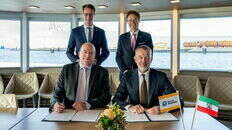- The ports signed a new letter of intent to develop sustainable transport corridors.
- Focus includes CO2 export for 'hard to abate' industries via CCUS.
- The Rhine corridor is emphasized as a sustainable logistics hub.
- Past successes include green energy transport partnerships and digital system advancements.

Cooperation for Sustainable Transport
The ports of Duisburg and Rotterdam have signed a new letter of intent to enhance their collaboration in developing sustainable transport corridors. This initiative aims to support the decarbonization of industry and strengthen the logistics axis along the Rhine corridor.
Focus on CO2 Export
A key element of the cooperation is the export of CO2, crucial for 'hard to abate' industries. The ports will facilitate cross-border carbon capture, utilization, and storage (CCUS) activities, creating conditions for efficient carbon management.
Strengthening the Rhine Corridor
The agreement emphasizes the importance of the Rhine corridor as a sustainable logistics hub. As Europe's most significant waterway, it plays a vital role in energy supply and access to international markets, ensuring the competitiveness of companies along the value chain.
Past Achievements and Future Goals
Previous collaborations include partnerships for green energy transport and advancements in digital port community systems. The ports aim to continue these efforts, focusing on renewable energy imports and enhancing inland shipping logistics.

